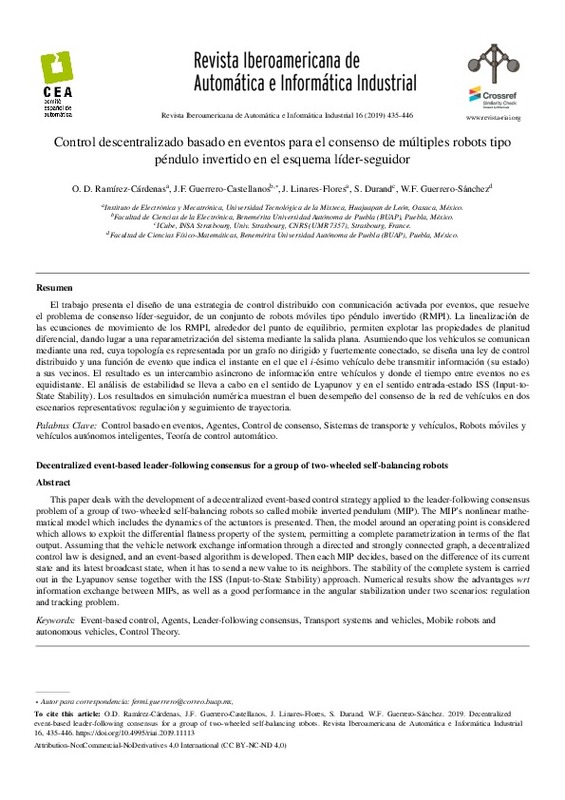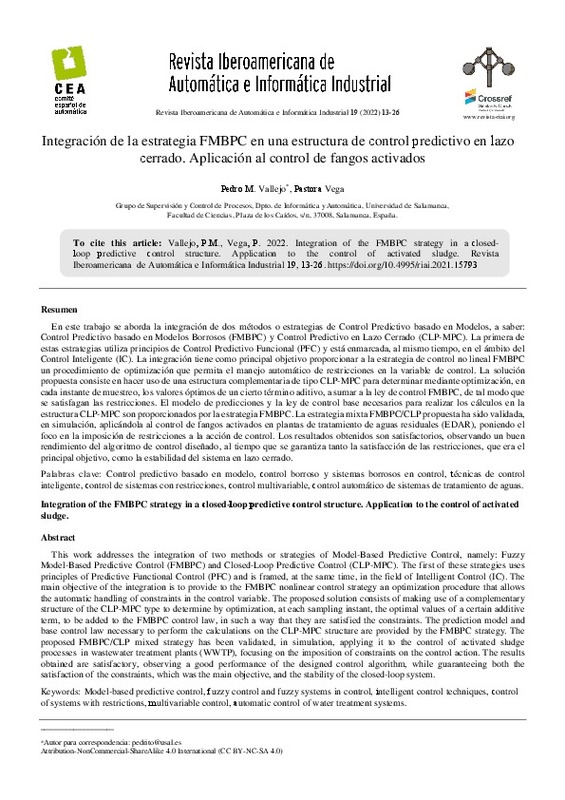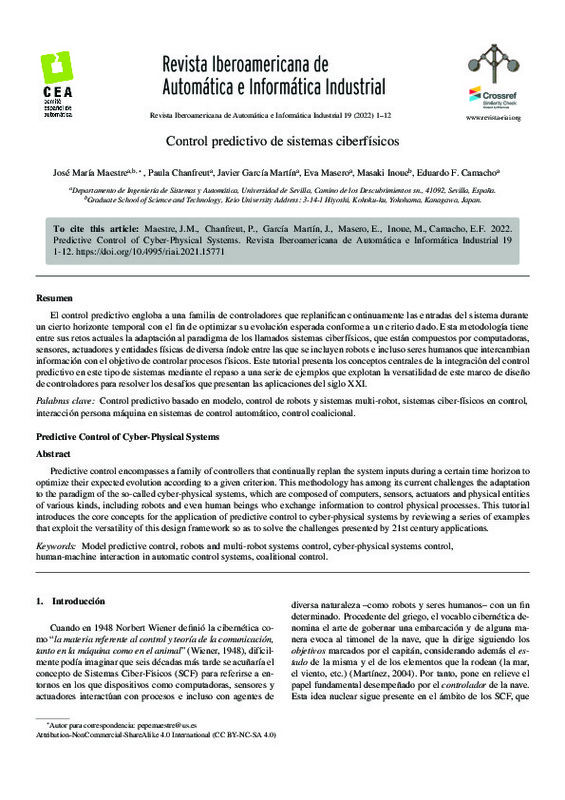JavaScript is disabled for your browser. Some features of this site may not work without it.
Buscar en RiuNet
Listar
Mi cuenta
Estadísticas
Ayuda RiuNet
Admin. UPV
Control descentralizado basado en eventos para el consenso de múltiples robots tipo péndulo invertido en el esquema líder-seguidor
Mostrar el registro sencillo del ítem
Ficheros en el ítem
| dc.contributor.author | Ramírez-Cárdenas, O.D.
|
es_ES |
| dc.contributor.author | Guerrero-Castellanos, J.F.
|
es_ES |
| dc.contributor.author | Linares-Flores, J.
|
es_ES |
| dc.contributor.author | Durand, S.
|
es_ES |
| dc.contributor.author | Guerrero-Sánchez, W.F.
|
es_ES |
| dc.date.accessioned | 2019-09-24T07:56:15Z | |
| dc.date.available | 2019-09-24T07:56:15Z | |
| dc.date.issued | 2019-09-20 | |
| dc.identifier.issn | 1697-7912 | |
| dc.identifier.uri | http://hdl.handle.net/10251/126287 | |
| dc.description.abstract | [EN] This paper deals with the development of a decentralized event-based control strategy applied to the leader-following consensus problem of a group of two-wheeled self-balancing robots so called mobile inverted pendulum (MIP). The MIP’s nonlinear mathematical model which includes the dynamics of the actuators is presented. Then, the model around an operating point is considered which allows to exploit the differential flatness property of the system, permitting a complete parametrization in terms of the flat output. Assuming that the vehicle network exchange information through a directed and strongly connected graph, a decentralized control law is designed, and an event-based algorithm is developed. Then each MIP decides, based on the difference of its current state and its latest broadcast state, when it has to send a new value to its neighbors. The stability of the complete system is carried out in the Lyapunov sense together with the ISS (Input-to-State Stability) approach. Numerical results show the advantages \textit{wrt} information exchange between MIPs, as well as a good performance in the angular stabilization under two scenarios: regulation and tracking problem. | es_ES |
| dc.description.abstract | [ES] El trabajo presenta el diseno de una estrategia de control distribuido con comunicación activada por eventos, que resuelve el problema de consenso líder-seguidor, de un conjunto de robots móviles tipo péndulo invertido (RMPI). La linealización de las ecuaciones de movimiento de los RMPI, alrededor del punto de equilibrio, permiten explotar las propiedades de planitud diferencial, dando lugar a una reparametrización del sistema mediante la salida plana. Asumiendo que los vehículos se comunican mediante una red, cuya topología es representada por un grafo no dirigido y fuertemente conectado, se disena una ley de control distribuido y una funcion de evento que indica el instante en el que el i-ésimo vehículo debe transmitir informacion (su estado) a sus vecinos. El resultado es un intercambio asíncrono de información entre vehículos y donde el tiempo entre eventos no es equidistante. El análisis de estabilidad se lleva a cabo en el sentido de Lyapunov y en el sentido entrada-estado ISS (Input-to-State Stability). Los resultados en simulación numérica muestran el buen desempeño del consenso de la red de vehículos en dos escenarios representativos: regulación y seguimiento de trayectoria. | es_ES |
| dc.language | Español | es_ES |
| dc.publisher | Universitat Politècnica de València | |
| dc.relation.ispartof | Revista Iberoamericana de Automática e Informática. | |
| dc.rights | Reconocimiento - No comercial - Sin obra derivada (by-nc-nd) | es_ES |
| dc.subject | Control basado en eventos | es_ES |
| dc.subject | Agentes | es_ES |
| dc.subject | Control de consenso | es_ES |
| dc.subject | Sistemas de transporte y vehículos | es_ES |
| dc.subject | Robots móviles y vehículos autónomos inteligentes | es_ES |
| dc.subject | Teoría de control automático | es_ES |
| dc.subject | Event-based control | es_ES |
| dc.subject | Agents | es_ES |
| dc.subject | Leader-following consensus | es_ES |
| dc.subject | Transport systems and vehicles | es_ES |
| dc.subject | Mobile robots and autonomous vehicles | es_ES |
| dc.subject | Control Theory | es_ES |
| dc.title | Control descentralizado basado en eventos para el consenso de múltiples robots tipo péndulo invertido en el esquema líder-seguidor | es_ES |
| dc.title.alternative | Decentralized event-based leader-following consensus for a group of two-wheeled self-balancing robots | es_ES |
| dc.type | Artículo | es_ES |
| dc.date.updated | 2019-09-24T06:56:41Z | |
| dc.identifier.doi | 10.4995/riai.2019.11113 | |
| dc.rights.accessRights | Abierto | es_ES |
| dc.description.bibliographicCitation | Ramírez-Cárdenas, O.; Guerrero-Castellanos, J.; Linares-Flores, J.; Durand, S.; Guerrero-Sánchez, W. (2019). Control descentralizado basado en eventos para el consenso de múltiples robots tipo péndulo invertido en el esquema líder-seguidor. Revista Iberoamericana de Automática e Informática. 16(4):435-446. https://doi.org/10.4995/riai.2019.11113 | es_ES |
| dc.description.accrualMethod | SWORD | es_ES |
| dc.relation.publisherversion | https://doi.org/10.4995/riai.2019.11113 | es_ES |
| dc.description.upvformatpinicio | 435 | es_ES |
| dc.description.upvformatpfin | 446 | es_ES |
| dc.type.version | info:eu-repo/semantics/publishedVersion | es_ES |
| dc.description.volume | 16 | |
| dc.description.issue | 4 | |
| dc.identifier.eissn | 1697-7920 | |
| dc.description.references | Ahmed, N., Cortes, J., Martinez, S., 2016a. Distributed control and estimation of robotic vehicle networks: Overview of the special issue. IEEE Control Systems 36 (2), 36-40. https://doi.org/10.1109/MCS.2015.2512030 | es_ES |
| dc.description.references | Ahmed, N., Cortes, J., Martinez, S., 2016b. Distributed control and estimation of robotic vehicle networks: Overview of the special issue-part II. IEEE Control Systems 36 (4), 18-21. https://doi.org/10.1109/MCS.2016.2558398 | es_ES |
| dc.description.references | Aström, K. J., Murray, R. M., 2010. Feedback systems: an introduction for scientists and engineers. Princeton University Press. https://doi.org/10.2307/j.ctvcm4gdk | es_ES |
| dc.description.references | Brisilla, R., Sankaranarayanan, V., 2015. Nonlinear control of mobile inverted pendulum. Robotics and Autonomous Systems 70, 145 - 155. https://doi.org/10.1016/j.robot.2015.02.012 | es_ES |
| dc.description.references | Bullo, F., Cortés, J., Martinez, S., 2009. Distributed Control of Robotic Networks: A Mathematical Approach to Motion Coordination Algorithms: A Mathematical Approach to Motion Coordination Algorithms. Princeton University Press. https://doi.org/10.1515/9781400831470 | es_ES |
| dc.description.references | Chung, T. L., Bui, T. H., Nguyen, T. T., Kim, S. B., Jul 2004. Sliding mode control of two-wheeled welding mobile robot for tracking smooth curved welding path. KSME International Journal 18 (7), 1094-1106. https://doi.org/10.1007/BF02983284 | es_ES |
| dc.description.references | Dimarogonas, D. V., Frazzoli, E., Johansson, K. H., 2012. Distributed eventtriggered control for multi-agent systems. IEEE Transactions on Automatic Control 57 (5), 1291-1297. https://doi.org/10.1109/TAC.2011.2174666 | es_ES |
| dc.description.references | Durand, S., Marchand, N., Aug 2009. Further results on event-based pid controller. In: Control Conference (ECC), 2009 European. pp. 1979-1984. https://doi.org/10.23919/ECC.2009.7074694 | es_ES |
| dc.description.references | Frías, O. O. G., 2013. Estabilización del péndulo invertido sobre dos ruedas mediante el método de lyapunov. Revista Iberoamericana de Automática e Informática Industrial RIAI 10 (1), 30 - 36. https://doi.org/10.1016/j.riai.2012.11.003 | es_ES |
| dc.description.references | Garcia, E., Cao, Y., Wang, X., Casbeer, D. W., July 2015. Decentralized eventtriggered consensus of linear multi-agent systems under directed graphs. In: 2015 American Control Conference (ACC). pp. 5764-5769. https://doi.org/10.1109/ACC.2015.7172242 | es_ES |
| dc.description.references | Ge, X., Han, Q. L., 2017. Distributed formation control of networked multiagent systems using a dynamic event-triggered communication mechanism. IEEE Transactions on Industrial Electronics PP (99), 1-1. | es_ES |
| dc.description.references | Grasser, F., D'Arrigo, A., Colombi, S., Rufer, A. C., Feb 2002. Joe: a mobile, inverted pendulum. IEEE Transactions on Industrial Electronics 49 (1), 107-114. https://doi.org/10.1109/41.982254 | es_ES |
| dc.description.references | Guerrero Castellanos, J. F., Vega-Alonzo, A., Marchand, N., Durand, S., Linares-Flores, J., Mino-Aguilar, G., 2017. Real-time event-based formation control of a group of vtol-uavs. In: Proceedings of the 3rd IEEE International Conference on Event-Based Control, Communication and Signal Processing (EBCCSP). Hal-01527633. https://doi.org/10.1109/EBCCSP.2017.8022817 | es_ES |
| dc.description.references | Guinaldo, M., Fábregas, E., Farias, G., Dormido-Canto, S., Chaos, D., Sánchez, J., Dormido, S., 2013. A mobile robots experimental environment with event-based wireless communication. Sensors 13 (7), 9396-9413. https://doi.org/10.3390/s130709396 | es_ES |
| dc.description.references | Hebertt Sira-Ramírez, Alberto Luviano-Juárez, M. R.-N. E.-W. Z.-B., 2017. Active Disturbance Rejection Control of Dynamic Systems. Butterworth- Heinemann. | es_ES |
| dc.description.references | Lewis, F. L., Zhang, H., Hengster-Movric, K., Das, A., 2013. Cooperative control of multi-agent systems: optimal and adaptive design approaches. Springer Science & Business Media. https://doi.org/10.1007/978-1-4471-5574-4 | es_ES |
| dc.description.references | Li, Z., Yang, C., Fan, L., 2003. Advanced Control of Wheeled Inverted Pendulum Systems. Springer-Verlag London. | es_ES |
| dc.description.references | Marchand, N., Durand, S., Guerrero-Castellanos, J. F., 2013. A general formula for event-based stabilization of nonlinear systems. Automatic Control, IEEE Transactions on 58 (5), 1332-1337. https://doi.org/10.1109/TAC.2012.2225493 | es_ES |
| dc.description.references | Müllhaupt, P., 2009. Introduction à l'analyse et à la commande des systèmes non linéaires. PPUR Presses polytechniques. | es_ES |
| dc.description.references | Olfati-Saber, R., Murray, R. M., 2004. Consensus problems in networks of agents with switching topology and time-delays. Automatic Control, IEEE Transactions on 49 (9), 1520-1533. https://doi.org/10.1109/TAC.2004.834113 | es_ES |
| dc.description.references | Pathak, K., Franch, J., Agrawal, S. K., June 2005. Velocity and position control of a wheeled inverted pendulum by partial feedback linearization. IEEE Transactions on Robotics 21 (3), 505-513. https://doi.org/10.1109/TRO.2004.840905 | es_ES |
| dc.description.references | Ren, W., Beard, R. W., 2008. Distributed consensus in multi-vehicle cooperative control. Springer. https://doi.org/10.1007/978-1-84800-015-5 | es_ES |
| dc.description.references | Salerno, A., Angeles, J., Sept 2003. On the nonlinear controllability of a quasiholonomic mobile robot. In: 2003 IEEE International Conference on Robotics and Automation (Cat. No.03CH37422). Vol. 3. pp. 3379-3384 vol.3. | es_ES |
| dc.description.references | Sánchez, J., Guarnes, M., Dormido, S., 2009. On the application of different event-based sampling strategies to the control of a simple industrial process. Sensors 9, 6795-6818. https://doi.org/10.3390/s90906795 | es_ES |
| dc.description.references | Sanchez-Santana, J., Guerrero-Castellanos, J., Villarreal-Cervantes, M., Ramírez-Martínez, S., 2018. Control distribuido y disparado por eventos para la formación de robots móviles tipo (3, 0) ' ?. In: Congreso Nacional de Control Automático. | es_ES |
| dc.description.references | Schinstock, D., McGahee, K., Smith, S., July 2016. Engaging students in control systems using a balancing robot in a mechatronics course. In: 2016 American Control Conference (ACC). pp. 6658-6663. https://doi.org/10.1109/ACC.2016.7526719 | es_ES |
| dc.description.references | Segway, 2018. Segway human transporter. URL: http://www.segway.com | es_ES |
| dc.description.references | Seyboth, G. S., Dimarogonas, D. V., Johansson, K. H., 2013. Event-based broadcasting for multi-agent average consensus. Automatica 49 (1), 245- 252. https://doi.org/10.1016/j.automatica.2012.08.042 | es_ES |
| dc.description.references | Sira-Ramírez, H., Agrawal, S. K., 2004. Differentially Flat Systems. Marcel Dekker, Inc. https://doi.org/10.1201/9781482276640 | es_ES |
| dc.description.references | Tabuada, P., 2007. Event-triggered real-time scheduling of stabilizing control tasks. IEEE Transactions on Automatic Control 52 (9), 1680-1685. https://doi.org/10.1109/TAC.2007.904277 | es_ES |
| dc.description.references | Tsai, C. C., Li, Y. X., Tai, F. C., Sept 2017. Backstepping sliding-mode leader- follower consensus formation control of uncertain networked heterogeneous nonholonomic wheeled mobile multirobots. In: 2017 56th Annual Conferen- ce of the Society of Instrument and Control Engineers of Japan (SICE). pp. 1407-1412. https://doi.org/10.23919/SICE.2017.8105661 | es_ES |
| dc.description.references | Velasco, M., Martí, P., Bini, E., 2009. On lyapunov sampling for event-driven controllers. In: Decision and Control, 2009 held jointly with the 2009 28th Chinese Control Conference. CDC/CCC 2009. Proceedings of the 48th IEEE Conference on. IEEE, pp. 6238-6243. https://doi.org/10.1109/CDC.2009.5400541 | es_ES |
| dc.description.references | Xie, D., Xu, S., Zhang, B., Li, Y., Chu, Y., 2016. Consensus for multi-agent systems with distributed adaptive control and an event-triggered communication strategy. IET Control Theory Applications 10 (13), 1547-1555. https://doi.org/10.1049/iet-cta.2015.1221 | es_ES |
| dc.description.references | Yamamoto, Y., 2009. Nxtway-gs model-based design. | es_ES |
| dc.description.references | Yang, D., Ren, W., Liu, X., Dec 2014. Decentralized consensus for linear multi- agent systems under general directed graphs based on event-triggered/self- triggered strategy. In: 53rd IEEE Conference on Decision and Control. pp. 1983-1988. https://doi.org/10.1109/CDC.2014.7039689 | es_ES |
| dc.description.references | Zhou, F., Huang, Z., Yang, Y., Wang, J., Li, L., Peng, J., 2017. Decentralized event-triggered cooperative control for multi-agent systems with uncertain dynamics using local estimators. Neurocomputing 237, 388 - 396. https://doi.org/10.1016/j.neucom.2017.01.029 | es_ES |











